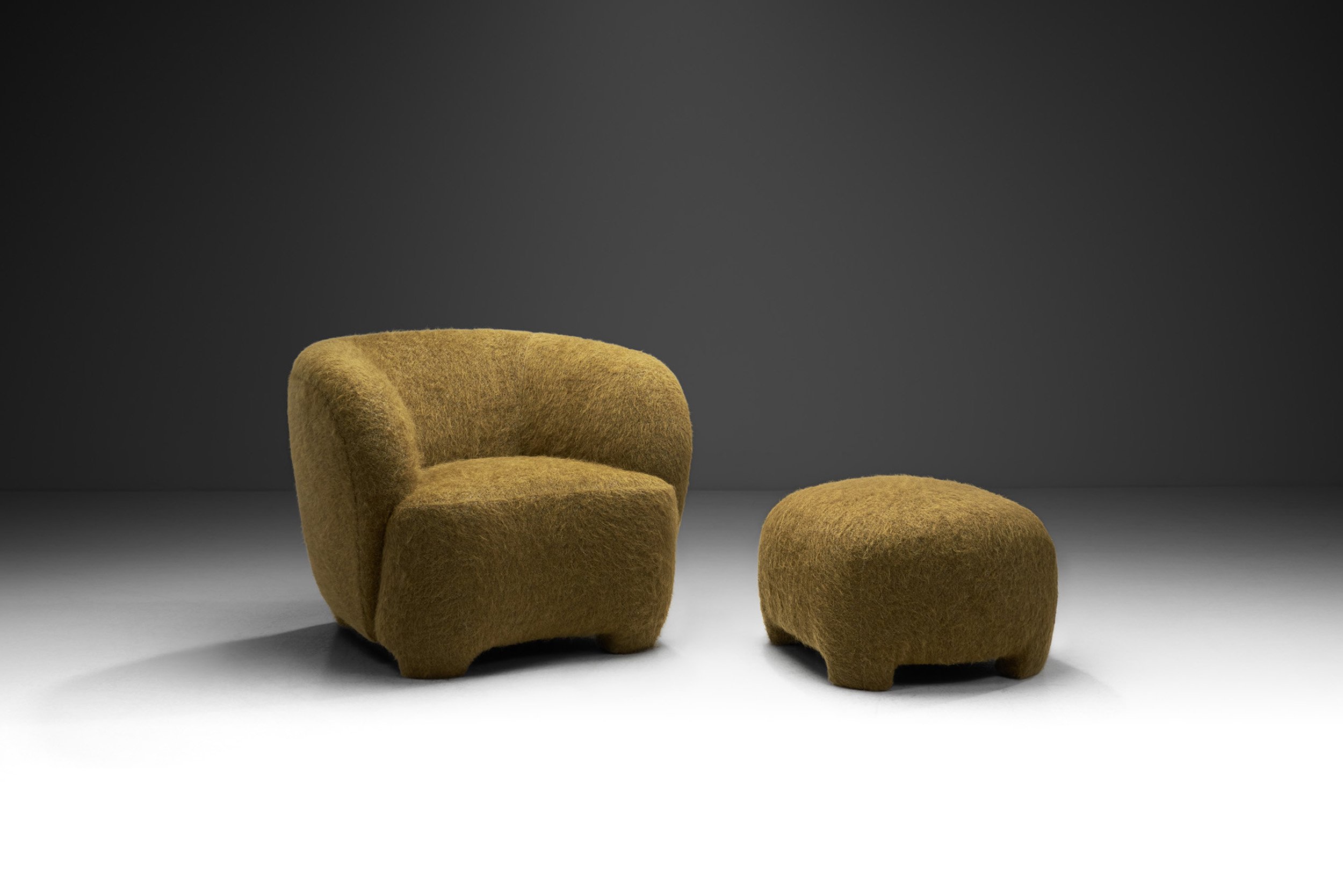“Clam Chair" in Sheepskin by Arnold Madsen for Madsen & Schubell, Denmark 1944 (sold)















“Clam Chair" in Sheepskin by Arnold Madsen for Madsen & Schubell, Denmark 1944 (sold)
This “Clam” chair has a beloved design thanks to which it is considered by many as one of the most attractive chairs of Nordic Design. At the same time, this chair is arguably also the most mysterious piece on the Danish furniture market.
The model has a rather perplexing history, and has been attributed to several designers before, the latest being the Danish architect Phillip Arctander. However, recent research revealed that the “Clam” is the model that in fact started the story of Madsen & Schubell. Arnold Madsen designed this model in 1944 in his small basement workshop in Gothersgade, Copenhagen.
This chair has a characteristic organic shape with soft curves, perched on club-shaped beech legs. The name comes from the shape of the seat and back that together form the silhouette of an open clam. The round armrests compliment the overall round feel of the chair. The seat is slightly raised towards the front, while the back is tilted to provide great sitting comfort. The seat and back are covered in black sheepskin, adding to the soft and cosy feel of this “Clam”. Interestingly, Hans Schubell invented the special connecting piece of this chair, formed from only one piece of wood. The rest of the seat and backrest were glued to this single piece.
In 1944, the chair was already exhibited in conjunction with the presentation of the newly opened furniture store NY FORM A/S in Copenhagen, which sold the leading design of the day. In 1945, the Clam went into serial production as the first model of the new furniture company Madsen & Schubell and many well-known stores soon included Madsen & Schubell in their product range. Illums Bolighus was one of them, as were the Messen department store and the Copenhagen furniture store Nordisk Staal-og-Møbel Central. In 1953, Madsen & Schubell sold the licence of the chair to the Norwegian company Vik and Blindheim.
SOLD
Condition:
In good vintage condition. Wear consistent with age and use. Each of our items can be re-upholstered by our in-house atelier in a fabric of choice. Please reach out for more information.
Dimensions:
25.39 in W x 33.07 in D x 29.72 in H; Seat height 15.94 in
64.5 cm W x 84 cm D x 75.5 cm H; Seat height 40.5 cm
About the designer:
Henry Hans Schubell was born on February 23. 1906 in Elsinore, Denmark. After completing school, he became an apprentice cabinetmaker in Elsinore. After 5 years he finished his apprenticeship, and was awarded a medal for his work. When he turned 20, he moved to Copenhagen, where he worked for various cabinetmakers. In 1929, at the age of 23, he was employed as a foreman at the cabinetmakers Winter & Winding, where he supervised the production of furniture until 1945.
In 1944, the firm received a request from an upholsterer named Arnold Madsen, who had an idea for a chair. Madsen was having difficulties finding a cabinetmaker with the required skills to do the woodwork based on Madsen’s little plaster model. Henry Schubell succeeded in producing the wooden frame, making it possible for the chair to be put into production. Arnold Madsen was so impressed by his work that he suggested forming a partnership where Henry Schubell would design the furniture and produce the wooden frames, which Arnold Madsen would then upholster and market. The workshop was realized in the inner city of Copenhagen, and their joint venture was named “Madsen & Schubell”.
The cooperation between Henry Schubell and Arnold Madsen was so successful that they purchased a factory building on the outskirts of Copenhagen. Over the next 20 years, the company produced several successful models, most of which were designed by Henry Schubell. Some of these chairs were licensed to the Norwegian company Vik & Blindheim and to the Dutch company Bovenkamp.
The cooperation between the two ended in 1963, and by mutual agreement, Arnold Madsen established his new upholstery firm under the name “Madsen og Schubell”, in cooperation with his son, Ib Madsen. In the 1970s, Ib took over the company which still ran under the name Madsen & Schubell causing some confusion about the attribution of Madsen & Schubell models. ~H.












